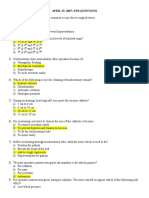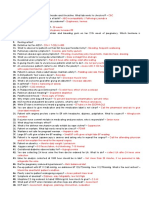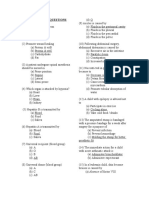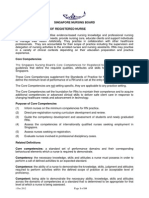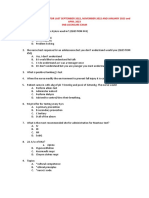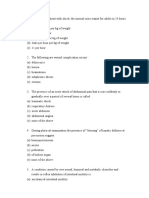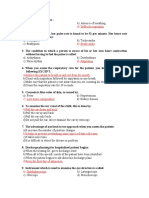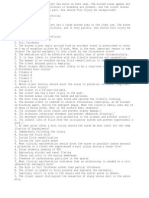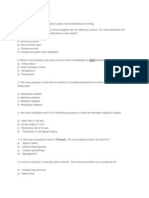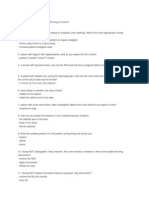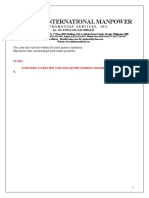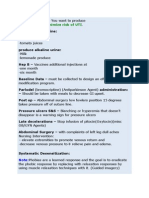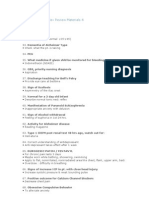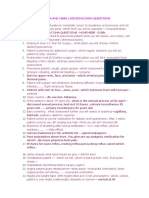100%(4)100% found this document useful (4 votes)
7K views25 pagesSample Reviewer of SNB
SNB
Uploaded by
Ben DaoangCopyright
© © All Rights Reserved
We take content rights seriously. If you suspect this is your content, claim it here.
Available Formats
Download as PDF or read online on Scribd
100%(4)100% found this document useful (4 votes)
7K views25 pagesSample Reviewer of SNB
SNB
Uploaded by
Ben DaoangCopyright
© © All Rights Reserved
We take content rights seriously. If you suspect this is your content, claim it here.
Available Formats
Download as PDF or read online on Scribd
You are on page 1/ 25
THINGS TO STUDY:,
1. ASTHMA
2. POSITIVE END EXPIRATORY PRESSURE
3. SIGNS OF INCREASE - ICP
4, RHYTHM OF ECG : V-TACH> management
5. POSITION POST HIP ARTHROPLASTY
6. SIDE EFFECT OF NEBULIZATION
7. TRACHEOSTORY (CARE OF PATIENT WITH TRACHE)
8. EPISTAXIS (management)
9. TRACTION
10. BEST SITE OF CHECKING 02 SATURATION IN HYPOVOLERIC PATIENT
CHOISES:
a. EARLOBE
». FINGERTIPS
c. TOES
11. AGINA PECTONIS / ML
12. INCENTIVE SPIROMETRY
13, PUFF
STUDY:
A.
1, Asthma 5. Ortho cases ex. Tractions
2. DM 6. Normal values ~ Het. Het,
3. Computations ~ IVF 7. Heart attack/CPF
4. Conversion of grams ~ milligrams 8. Tidal Volume
B. ,
1. Hypertension 9. Pediatric
2. Personality disorder 10. Neurological Assessment
3. Heal conduct 11, Hemodialysis
4 12.
5. 13. Schizophrenia
6. 14, Imperforated Anus
7. Cysto Turp 15. Hyperkalemia
8. Total laryngectomy 16. Hypokalemia
©,
1. Pre-anesthetics commonly used by anesthesiologist
*Promethazine and Atrophine
2. Normal CVP reading
"10-12 mm Hg
Comminuted fracture ~ a fracture where bone is broken into more than two pieces.
Treatment of hyperhalcemia
Signs & symptoms of increase intracranial pressure
“Nausea & vomiting, brady cardia, increasing systolie BP with widening pulse
paw
D. If there is excessive tissue loss, wound heals by:
a. Primary intention
b. Secondary intention
©. Tertiary intention
E. In case of metabolic acidosis gives:
a. Sodium bicarbonate 4.2%
b. Sodium bicarbonate 8.2%
©. Potassium chloride
F. Build transfusion; immediate action when pt. Experience chills & rigor
G. Venticular defibrillation
.
Complication after appendectomy peritonitis
Riood investigation which needs immediate attention before appendectomy pt. of 29
Normal values
Side effect of AtSo4
Indication of AtSo4
yaerr
SAMPLE TEST:
1. Normal CVP reading
2. Normal Hermoglobin in males
(@) 13-18 gmvdi (b) 12-16 gmval
3. Ultraviolet lights can aggrevete
(a) Jaundice (b) cataract (©) diacthea
4, What is the normal blood glucose?
(@) 80-120 () 80-180
5. Purpose of pressure dressing in post-operative patient
(a) To prevent contamination (b) to protect from injury
6. The distance in sneelen’s test to pt?
(@) 6-9 meter (b) 10-15 meter
7. Sneelen chart 6/9
8. Indicate the wound dehiscence?
9. In severe metabolic acidosis what will the physician order or give?
10. ABG
11, Cleaning/dressing the wound
(a) Start from inner to outer —_(b) outer to inner
12, Tracheostomy
13. Normal effect of surgery post-operative after 3 days
(a) sodium-140 (b) potassium 3.3
14, Controlled analgenic
15. In post-operative pt. to prevent deep vein thrombosis
16, Second intention healing
(a) Primary (b) granulation (c) contraction
17. In instilling eyedrop
(a) Conjunctiva (b) cornea
18, Cleft palate should be. ‘Surgically treated before 1-2 years old
19. CPR infant
(a) Hyper extend the neck (b) lateral position
20. Patient with thrombocytopenia what drug is to prevent from taking?
(@) aspirin (b) paracetamol (©) Acetaminophen
21. Administration of ATSOY, what indicates problem?
(a) hypertension (b) pulse rate 150 b/m
22, Patient complaining of pain in IV site, what should the nurse do?
(@) check Iv site for phlebitis () check for air
23. Position of patient with post operative under general anesthesia
(a) supine () fowlers
24. Patient who will undergo surgery and obese, the physician advise patient to lose weight
before surgery, how will bs the nurse explain pt?
(4) loosing weight before surgery will make you move comfortable after surgery
(b) loosing weight lessen the risk of infection
Sample Test Question
‘True or False
Primary health care is open for all age group.
Cerebospinal fluid is ubsorbed by the choroids plexus
[Tue right to do when there isa stab wounds, is to remove the forcign matter immediately,
Apgar score determines maturity of the baby.
Sterilization (otal destruction) and disinfection (partial destruction) is different because...
CHO is stored in liver as glycogen,
Apex of the heart is determined in the anterior Portion between 5® and 8"*intercostals space.
Honey is an example of complex carbohytirates.
.,, ntradermal congestion is done at 10 degree ~ 15 degree angle
10. Pulmonary congestion ~ $/SX— at gain, &rthopfiea, tachypnes.
11, The infant passes stool after sx hrs. this is called meconium stool. (The first stool of infantis
called metsitilim)
12. Hypothalatlus is the regulating center of temperature,
12. In the methbolic alklosis, the PO2 detkeases,
1 jury ~ equal & pupil size
2. Close head injury — complication
3. Status Epilipticus
4. Untreated hypothyroidism
5. Live virus vaccine example (polio, varicella, heap b)
6. Heostomy
7. Hemophilia ~ internal bleeding: what it the side
8. Hepa ~ standard precaution
SAMPLE TEST:
1, Pre-anesthetics commonly used by anesthesiologist
- Promethazine and Atrophine
2. Normal CVP reading
= 10-12 mm Hg
3. Comminuted fracture ~a fracture where bone is broken into more than two pieces
4, Treatment of hyperhaleemia
~_ IV glucose DSO and insulin
5. Sings & symptoms of increase intracranatial pressure
~ nausea & vomiting, bradycardia, increasing systolic BP with widering pulse
pressure
6. IV Computation
7. Hemohialysis ~ principle used diffusion,osmosis, filtration
8. Maternal infection that can cause cataract in newborn — gonorthea
9. CVA
10. Stop burning process — apply cold H2O0
11, COPD
12. 1 priority in burn pt. ~ establish airways clearance
13. Computation drop factor
14, Insulin injection ~ 45 degrees subcutaneous
15. Nursing intervention for burn patient ~ give colloid therapy
16. During ICP when the pupil change suspected of hematoma
17. Dementia ~ psychological border during old age
18. During head injury your nursing priority — do not move patient
19. Nursing intervention for pneumothorax ~ chest tube insertion
20. Diabetis Mellitus — purpose of rotating sites of injection
Ans. Drug absorption and prevention of injury
21, (Insulin) subcutaneous injection, if given in the anterior portion of the abdomen, we will
inject at what degrees?
22, Asthma is caused by following symptoms except dilation of the bronchiles
23. $/Symptoms of increased intracranial pressure
Ans. Bradycardia, increasing systolic BP and widening pulse pressure
24, Basic psychological test — Ans. Ask name
25. Most important nursing care for a dying patient
Ans. Promotion of self-integrity and self-esteem
26, Drugs and solutions
27, Bronchial Asthma
28..Epinephrine
49. Lreatment for hypoglycemia
30. Total laryngectomy purpose
31, Dysphagia what is it, management and nursing action
32. Seizure — management and nursing action.
33. Convulsion - intervention and nursing action
34. Hypertension
35. precation when feeding
36. Acute Gastroenteritis — where to take temperature
37. Febrile patient ~ what to do
38. Site of injection DM and what degrees (45 degree subcutaneously)
39. Reason of subcutaneously injection in giving insulin
40, Hand washinig - universal precaution
41. Heart rate of newborn
42. Responsible to death
43. Proper disposal of needle
44, Gauge of NGT suctioning/oral suctioning,
45. Hyperkalemia
Maintaining an effective airway clearance for unconscious patients
Complications of neglected mouth
Complication for frequent loose stool
POER 1,000 @ 20 givin! to-run for & degrees... how many drops per min
Pacemaker of the heart = S.A. Node
Which vitamin needed the intrinsic factor for it to synthesized — vitamin B12
Sungtaken Blakemore
Difference ofangina pain from myocardial infraction pain
Gastric cancer wie vitamin would likely the patient be deficient of = Vitamin B12
CSF ~choroids plexus
Myocardial infinction ~ ischemic myocardial
Bronchoscopy procedure — dry swallowing
Sterile technique in cleaning the wounds = start from the less contaminated to dirty
S/sx of px w/ renal calouli— flank pain & dysuria
Medicines for px w/ vent. Defibrillation — atrophine $O4
Who are the candidates for cervical eancer examination = sexually active individuals
How to give insulin injection subcutaneous (4Sdesree) what isthe bon site
Immediate action for tension pneumothorax = chest tube insertion
2ce injectable drugs = gluteus lateralis
Purpose of T-tube drainage in patient who has undergone cholecystectomy
‘Thigh muscles for injection = vastus lataralis
Purpose of rotaion sites of injection with DM patient
Proper position for patient with hip replacement = abduction
Intradermal injection — 15 degree angle
Ampicillin (500g)
Diluted in 2cc — how much will you give for 250 mg
Selfeare community partnership = Primary health care or Public health
Vastus lateralis
Conversion of gm to meq
Site of 1 m injection = deltoid muscle
Nerve to be prevented when giving deep m injection = sciatic nerve
15. liver. a. trypsinogen
16. pancreas ». seoretes bile
17. large bowel secretes pepsinogen
18, aminophyline 4. action of digitalis - reinforce the pumping
action of the heart
19. diazepam ©. dilate bronchial walls
20. digitalis £. strengthen keart muscles
& keep the patient relax
21. In asthma, the wheezing sound is heard during.
aexhale —b,inhale——c.exertion_—_d. exhaustion
22. Normal respiration of infant a. 30-60/min .20-3/min c.10-30/min 4. 50-70/min
23. COPD patient must received oxygen at whet amount
21-24% bi 24-18% 6.48-56% —d.50-70%
24. The 2 most common complications to be watched after bronchosopy
‘8. nausca and vomiting b. Hoarseness of voice c. increase SOB % largeal stridor.
dizziness & increase SOB
25. Two (2) liters of dextrose at 15 microdrops é to be run for 18 hrs. How many drops perniimute?
20 ba °.24 4.28
26. Cause spontaneous pneumothroax
8. rupture of a pleb (sub-Pleural) ». pleural fiction rub
27. Different attitudes that can cause the baby to deteriorate (except)
a. excessive smoking __b. proper diet andexercise _c, excessive alcohol intake
28. Good position of patient with pulmonary edema
29. LMP ~ April 15, 1992, When is EDC?
2.22/02/93 —b.15/02/93¢, 22/01/93
30. Characteristic of baby with cerebral palsy
a, scissored limbs. limbs rotating inwards ©. no reflexes on both limbs d,
limbs rotating upward
31, Cord care
a. wash w/ ehlohexidune . wash with cord spin. ¢. put petroleum jelly 4
‘wash with soap and water
32, Principle of close suction,
. gravity-negative pressure suction _b. gravity-positive pressure suction
33, Organs involved that determines the fluid and electrolytes production and losses
8. endocrine, urinary and cardiovascular system
b. endoorine, integumentary and urinary system
. respiratory/pulmonary endocrine and gastro-intestinal system
4. cardiovasculas, urinary and CNS
34, In taking accurate intake and output, the nurse must know
8. fluid and electrolyte production and losses in the body compartment
b. different food intake
©. monitoring all given foods and medicines
35. The involved in hypoxia
intersusception __b, hintal hernia c, esophageal astresia d, hirschprung dicase
36. Organ involved in hypoxia
a. heart D.kidney ——¢, brain 4. liver
37. Which part of the heart carries oxygen blood that goes through the aorta?
a. left ventricle b. right ventricle. . right atrium 4d. left arteium
38. Important elements ofthe bone
&Ca&Na b.Ca&PO4 ¢,Na&PO¢ dK &Na
39, What elements ean you get from egg yoik?
protein “b.albumin ¢, CHO
40, The purpose of drying the baby after birth
‘ prevent heat loss b, promote circulation _c. promote respiration
pees mane 1
avis”, bacteria
42. Oral Thrust of an infant is caused by
8. streptococei . Escherichia ©. Candida,
43. When is iron tablet best taken?
8, before meals », after meals cevening —d, early moming
44, Broad spectrum antibiotics
a.ampicillin b. penicillin ¢, streptomycin 4. vancomycin
45, Penicillin action
8. inhibits cell wall synthesis
46, Sealp disease is caused by
fungus b. protozoa ¢, virus
47. Best site for bone narrow aspiration
2. posterior iliac crest. diaphysis of the bone
48. Vaceines are
& natural wctive immunity, aequired active immunity. natural passive
natural active immunity
49. Which is considered cyanotic type of disease?
a. tetralogy fatal b.ASD USD
50. Hormation and the brain is usually located at,
a. foremen magnum —b. porpous nucleus
51, Determination of right-handed and left-handed person
8. right hemisphere is dominated by left hemisphere _b. there is dis...
52, Primary nursing care of patient and seizures
a. prevent injury . clear
53, Tatanus-toxoid
a. 1 year b.2years 6.3 yoars
$54. Follicle responsible for masturbation and fertilization
&.corpoz luteum. grafian folloiele
55. Hormone responsible for bodily changes during puberty
a.estrogen _b, progesterone
‘Tracheastomy is done where there is
a. Isryngeal spasm —_b. ventilation
‘57. Restrains or detention maybe called
a, unauthorized ». false imprisonment
$8. Dexogin is ordered 5.0g, you know that if you give, it wil cause overdose of drug, What will you
do?
{do not give. administer the drug call the doctor who ordered and confirm it
59. Rich in potassium
banana * b. apple
36,
60, Airopine is given pre-operntively, why’?
a. vagolytic
61. Cord care
8. wash with soap & water _b. wash with cord apirit c. wash with alcohol d,
‘wash with chlorhexidine
62. Putpose for T-tube after cholecystestomyn drainage of
a lymph +b, bile c. blood a. pus
63. The following can cause hypovalemic shook except
a. bums ». severe hemorrhage e.severediathea intense pain
64, Malaria also cause bleeding of
a. anus b.rectum ——_c. colon 4. stomach
65. What organ is most badly affected by hypoxia?
heart b.kidney —c, brain 4. liver
66. During seizure/epileptic episode, what is the most important nursing responsible?
a. give glass of water to drink ». protect the person c. administer oxygen
7. Katio of cardiac compression to ventilation with one rescuer
a. 15:2 BIS: 25:1
as
68. NGT accidentally remove from the patient, what is your fist nusing action?
a.
re-insert the NGT tube
form the physician . reassure the patient ©. mouth care
69. For a burn patient, how do you stop the burning process?
scold pack b. cover the burn srea c. apply ointment 4, wash with water
70, Lead poisoning causes
8. brain injury, b. cardiac attack c.
71. Most seriously for elderly patient for CKA.
a. falling —_b. hip dislocation
respiratory distress
72. For a bum patient, how do you stop the burning process?
2 coldpack | b.cover the bum area. apply ointment d. wash with water
73. What is the strength of adrenaline during CPR?
2.1:10 b.1100c. 121,000. 1:1,000,000
74. What electrolyte is responsible for bone formation?
aNaCa — b.CAPO2 ec. POLK
75. Drugs for seizure
a.dilantin§ —b. valium ——_. pramazine
76. COPD patient.
a. nasal prolonged —_b.O2 mask —_¢. O2 vent
77. Before i
a. responsiveness ——_b, unresposiveness _¢, pulse rate
78. Effective way to stop bleeding
a. direct digi
79. In care of tyrotoxicosis except
pressure », pressure on pressure point tourniquet power
a. tremors b.wt. Gain. wt.Loss appetite
80. Serious complication of appendicitis @ hemorrhage
a. peritonitis...
81. Universal recipient
a. AB Exe} cB
82. Position of unconseious patient
aa
8. head tilt chin lit. head tilt neck lift
83. After hemorrhoidectomy, hot sis batch given to
common beating Prevent hemorrhage. relieve pain prevent constipation
54. Most common complication when the Parathyroid Gland is remove during thyroidectomy
a. tetany b. thyroid crisis ete
85. The color of CSF in TB meningitis is
a. blood-tinged,, —_b, clear e. cloudy
86. Sequela of liver eirhosis except
ascites. hypercalcemia _, portal Hpn
87. Your first nursing action for bronchial asthma
@.oxygem —_. positioning c.
88. Tho electrolyte imabalance while on dmretics
ahypermatremia —_b, hypokalemia
89, The cause of pain in myocardial infraction is
a.necrosis —b. ischemia etc
90. The common cause of cholecystitis is
4 fatty food. gall stop ete
91. Who should be given oral temperature
a babies b, very young children.
92, If you are being asked to serve the food of the
2.” Be generous for giving food in the patient
. Share with the other patient
©. Make sure that is given tothe right patient
bronchodilator
c. hyperkalemia
comatose px 4, mentally sound px
Patient, what should the nurse do?
93. What is the right hand washing method?
8. wash hands w/ warm water. wash hand w. cold water _¢, rubbing by using fiction
94. In the diabetic patient, you should give
a, beverage w/ no sugar b. tea, coffee c. soda drink
95. Reason why you need to press the trachea during intubation
a. for direct visualization, . to prevent coughing
NURSING CARE/TUBE FEEDING .
Keep head of bed elevated at all times to prevent aspiration
. Check placement of tube every 4 to 8 hours.
a. Aspirate stomach contents
b. Put stethoscope in the epigastrium and introduce § mi. of air into the tube, Tube is in
stomach if it produce “whoosing sound”
©. Ask patient to talk
3. Check for residual every 4 to 8 hours and hold feeding if more than 150 cc.
4. Irrigate tube with water after each feeding to maintain patency
5. Give feedings at room temperature to avoid nausea
6. Do not hang feeding for longer than 8 hours and change bag every 24 hours to avoid
contamination
7. Monitor for signs of dehydration such as urine output, decreased skin turgor, dry mucous
‘membranes.
8. Ifdiarrhea occurs, feeding may be changed er decreased in strength or antidiarthea agents
may be given
9. Administer by use of gravity or infusion pump, depeading on cost, need for close regulation
and consistency of feeding, .
NURSING MEASURES TO PREVENT COMPLICATIONS OF TRANSFUSION
1. Prior transfusion, ask patient about pas reaction. If patient has history of anaphylasis, alert
physician and have emergency drug available. Remain at bedside for the first 30 minutes,
Give antipyretic before transfusion as directed.
Do not permit blood to stand at room temperature longer than necessary,
Inspect blood for gas bubbles, clothing or abnormal color before transfusion,
Complete infusion 4 hours, Change administration set after 4 hours of use,
‘Transfuse ot a rate within the circulatory reserve of the patient.
Monitor the CVP of the patient with heart disease.
Meticulously verify patient identification,
Begin infusionslowly and observe closely for 30 minutes,
SPI awauy
‘TRANSFUSION REACTION OF BLOOD TRANSFUSION AND MANAGEMENT
1. ALLERGIC: flushing, itching, rash, urticaria, hives, asthmatic, wheezing, laryngeat edema,
‘anaphylasis.
MANAGEMENT: 1. Stop infusion immediately. Keep v.
2. Give antihistamine as directed.
3. Observe anaphylasis,
4. Prepare epinephrine if respiratory distress is severe.
open with normal saline.
2, FEBRILE: sudden chills and non-hemolytic fever, headache, flushing, anzety,
MANAGEMENT: 1. Stop infusion immediatcly. Keep vein open with normal saline. Notify
physician and blood bank.
"2, Send blood samples and blood bags to blood bank. Collect urine samples
for testing.
3. Check temperature,
4. Give antipyretic as prescribed.
PApid onset of chills, high fever, vomiting, diarrhea, marked h hypotensio
* 1. Stop transfusion immediately and KYO,
2. Obtain cultures of patient's blood and zetum blood bags with
Administration set to blood bank for culture,
{cet septicemin as directed (antibioti, IV uid, ‘asopresor, steroid,
etc.)
3
4 CIRCULATORY OVERLOAD: rise in venous, ‘Pressure, distended neck vein, dyspaea,
crackles at base of lungs.
MANAGEMENT: |. Stop transfusion immediately and KVO,
3. Place upright with feet in dependent postion,
5. Administer prescribed diuretics, oxygen, morphine and aminophylline.
cough,
# HEMOLYTIC REACTION: chits, fever, low back pains, feeling of head fullnessiflushing,
reoracten feeling, tachycardia, tachypnea, hypotension nacaie collapse,
jemogtobinemia, bleeding, acute renal fulture
MANAGEMENT: |. Stop transfusion immediately, Keep vein open with saline,
2. Notify physician and blood bank,
3. Treat shock if present.
4. Draw testing samples, collect urine samples,
5 Malntain blood presse with 1Vcolioid solutions, Give diuretic as
prescribed.
6. Insert indwelling catheter to monitor hourly urine output,
‘TUBE Is placed after surgery to allow drainage of bile unt edema subsides.
CARE OF T-TUBE,
n close gravity drainage system,
2. Observe end measure drainage. (Normal drainage Is 400 ml Per day and greenish
prown in color) As swecling decrease, dainage deereace
S- When bile drainage continuous through ttube for period of time, it may be ordered to
give bile drainage orally or through NGT to prevent flosd a electrolyte loss and for
Tat and vitamins absozption or bile salts may be endeaa
NURSING CARE OF OSToMIES (COLOSTOMY /LEosTomy)
1. Check stoma for normal dark pink to red color, minima! bleeding and no edema,
2, Empty pouch when 1/3 to 1/2 full,
3: Monitor output: descending & sigmoid colostomy = formed stool
semi-softliquid in consistency.
in stage of acceptance. Avoid expression of negative feelings when eating
for ostomy.
9. Utilize skin barrier to protect skin,
0. Appliance opening should be 1/8 of an inch larger than stoma opening.
ss 04 ua ts OUOE-PrOOt pouches if odor i a problem.
12; May irigate descending and sigmoid colostemy to stimulate peritalsis and evacoation of
Peet contents a specific ime each day rigate colostomy 56 days postop & win
bowel function is resumed,
IRRIGATING COLOSTOMY
+ Cleanse area with mild soap and water, pat dry.
~ Apply KARAYA preparation or other peristomal skin barier replace colostomy dressing
‘or pouch.
* Clean equipment with soap and water, dry before string in well-veitilated area,
~ Inspect skin and stoma for a change in appearance. Notify physician for sustatved dark:
color change.
13. Refer client to ostomy association for support and information,
SUBJECT TO BE REVIEWED:
1. MYOCARDIAL Infarction.
2..DM - insulin administration,
3. CPR.
4. Morphine Effect
5. Pediatric Cases
6.CVP
7. Fluid Imbalances
Tealosis
~ Acidosis
8. IV Fluids and Medication Computations
9. Medications Effect
10, Food Poisoning
1. (N) CVP Reading and insertion
2. Pulse depicit~ difference between apital and radial pulse.
3. Effect of old age in blood pressure-- vascular condition,
4, Cimetidine ~ effect
5. Safe measure to prevent bleeding - pressure/compression inthe site.
6. Breast examination - when isthe right time to do it
7. What t avoid when swallowed with corrosive substances — avoid GASTRIC WASH
OR LAVAGE.
8. QN) Value of sugar in blood before meal.
9, Psyehiattic questions
1. What are the commonly used medications by anesthesiologists pre-operatively?
a. Phenobarbitae & valium
b. Promethazine & amoxicillin
©. Morphine and ampicilin
2. What is the normal CVP in H20 manometer?
a. 1-6 mmhg
b.6-12 mm bg
6.16 cmH20
4. 6-16 cm H20
3. What causes “altered respiratory function”?
2. change int respiration
. respiratory distress
©. respiratory obstruction,
4. change in mental status
4. What is the medication for seizure?
a. atropine sulfate
. morphine
©. lorazepam
4d. Phenytroin restraints
5. What is the most appropriate nursing measure for clients with Methicilin-Resistant Staphylococeus
‘Aureus? .
. Strict isolation
b. Increase protein diet
. Use of restraints
4. Wear gloves when touching the patient
6. What is the nursing priority with viral pneumonia?
a. antibiotic treatment
b. increase 02 inhalation
©. treat according to symptoms
7. How does asthma differ from obstruction airway disease?
8. What is the most common behavior obsence in schizophrenia?
1. delusions
» illusions
©. auditory hallucinations
4. visual hallucinations
9. What causes cataract to newborns?
10, What is the priority nursing care for mentally-ill patients?
a. Institutional eare
b. Allowing them independent self-care & participating in normal daly activities
11, What is the common psychotic disorder of old age?
a. Dementia
. Schizophrenia
©. Personality Disorders
12, What is the nursing care for patients with co,
4. Establish nurse-patient relationship
, Watch out for suicidal tendencies
©. Use of restraints
13, What js the medication contraindicated for peptic ulcer?
a. Antacid
. Aspirin
. Acetaminophen
14, What is the first priority for Closed Head Injury?
a. Prevent hemorrhage
. Prevent edema
. Prevent Infection
115. What is the appropriate nursing care for Paracetamol Overdose?
1. Activated charcoal
. Increase fluid intake
Seer aas
16, What is true to Hepatitis B?
2, Life-time heap B carrier
», Short-term treatment
¢. Hand washing precaution needed
17- What isthe most common problém encountered by patients with stoma?
a. increase flatus
». increase bowel elimination
©. skin encrociation
18, BCG is for?
a. Tuberculosis
b, Pneumonia
©. Hepatitis
19. What are the symptoms of volume fluid deficit?
20. What is the electrolyte affected by UTI?
21. What is the importance of place therapy for children in the hospital?
2. to direct attention
b. to lessen the pain and increase interaction with hospital salt
©. for children to enjoy hospital stay
22. What is the priority care for burn?
a. Infuse intravenous themphy
>. Infuse infection by applying topical medications
¢, Replace electrolyte loss
%. When epinephrine cannot be given intravenously during emergency, give them
8. intracathelen
». intradermal
. intracardial
4. esophageal perforstion
». swelling and bleeding
25. What is the early sign of Hyporolemic shock
a. pulse of 90 mm Hg
b, bounding pulse
¢. rachycardia
26, Pain after TURP is received by
. Hot pack
b. Avoid lifting activities
27, What is the manifestation of Imperforated Anus?
° a. Ribbon-like stool
b. Watery stool
©. Non-passage of stool
28. What is the observed in healthy stoma?
2, bunish and swelling
». pall pink, moist
. small and retracted
‘rom wt wu the endotracheal tube?
30. Inguiral hernia
31. Hemodialysis
32. Hyperkalamia
33. Drug calcul
34, Heal conduit,
ion ~ drops per minute mg to grams
35. COR Pulmunale
36. Hemmorhoids
39. Comminted fracture
40, EDC .
41, Personality Disorders
1) Tracheostomy: for wic ofthe folloeing indicates this procedure
2. weaning a patient
.a positive pressure mechanical ventilate
2. connective tissue
be epithelial cet
2) Te following are the typical symptoms of depression extxpt
2. Elation
. Insomnia
‘©. unable to eat
4. dejection
4) Precocious puberty is
4. high pitched voice
». carly development of sexval maturity
©. hair in the exiita
5) In. pt with GERD, the diet is
8.3 times regular diet
beat large meal :
©. eat six small meal
©) In patient with PUD it is contraindicated to take
8. Aspirin
©. Prednisolone
4. Salbutamo!
7) A patient ia given an opiod analgesic and is having respiratory depression, the antidote
a. Aspirin
b. Mucolitic
©, Nalaxono
8) Paracetamol antidote
2. Heparin
». Salbutamol
©. Neacety/eystein
9) An example of crystalloid IV fluid is
18. dextrose 5%
».0.9NsS
10) Sign and symptom of 1P
f Binds cardia, increased systolic BP, widening pulse pressure
> Brady cardia, decreased systolic BP, widening pulse presane
11) A patient is having 11CP, to prevent
8. modified trendelenburg,
elevate the foot of the bed
©. 45 degrees head in the neutra! postion
vse position
12) Theophyitine side effect
8 palpitation
». brady cardia
13) In elderly, the reason of increased BP is
8. decreased elasticity of the wall of veins
obese
14) The common cause of disorientation/confsion in elderly ig
4, fluid and electrolyte imbalance
b. Infection
15) Sign and symptom of dementia
2. forgetfulness
able to finish an activity
16) The pt sustained a nerve injury causing foot drap , which nerve!
‘8, Femoral Nerve
». Peroneal Nerve
17) The following tes is to check coordination and balance except
2. Roomberg's
.Lap-sitting
-heel to shin
. graph thesis
18) A ptis to have casting before, the nsg priority is
8. check the neurovascular assessment as baseline
19) A child sustain a fall from a bike to check airway
head tlt chin if
jaw thrust maneuver
20) Post op Thyroidectomy to check for possible parathormone deficiency woof the ff lb test
all, +
'. Serum Calcium
21) What i tidal volume?
4. the volume of maximum inhalation
». the amount of air inhaled and exhaled during normal ventilation :
72) A pts diagnosed with DM & is HPN & isthe inflammation of peripheral nerves causing paresthesia
Ted to foot gangrene.
‘Retinopathy
b. Neuropathy
Slagnosed with hepatic encephalopathy wie ofthe exacerbate the ondton exon
2 gonaiaion
BPs of protein
€: Vitamin 3 comple
dade
24) A pts taking Thrombolytic medicine & experience acute stroke, the early sign & symptom
a. unheble to communicate
b. fin paralysis
25) A ptis in skin traction, w/c of the fTexercises to be implemented?
8, weight bearing exercises,
b isometric exercise
©. isotonic exercise
26) When to be done: Pap smear?
a. during menstruation
in the middie of menstrual eyele
c.after delivery of baby
217) The placenta in placenta previa
‘8. upper uterine segment
b. iow uterine segment
40) rca Ww prace yuginat pessary’?
2. before going t0 bed
b. after coitus
29) To characterize lesion.
2. location, size, contour
». diagnosis, treatment, contour
30) A typre I hypersensitivity
a.DM
'. Contact dermatitis
c.areephylaxie
31) Drug for status epilepticus
1. Aspirin
b. Diazepam
32) When there is extensive tissue, lous healing is done
‘8. Primary intention
b. Secondaty intention
©. tertary intention
33) The bone formation and caleium absorption
1. gramelation
b. caleitication
© callus formation
34) How to assess a pt with central brain assessment having a facial fracture except
a. trapezius
». orbicular pressure
mandibular pressure
35) Oropharyngeal airway can be given except
«vomiting
». gag reflex
«. lacerated tongue
36) Respiratory failure, the ABG shows
&.pH730 PO,40 PCO, 55
b.pH728 PO:85 PCO, 58
37) In compensation during shock
‘all vis drop
b.¥LOC’ |
.the body tries to compensate by *RR, PR & normal BP
'38) The pt heartbeat, BP 80/40, weak thread pulse, pt with Ml, possible complication
‘a. neurogenic shock
». hypovotemie shock
«. cardiogenic shock
39) ABG of Metabolic Alkalosis
&pH7.50 PCO,35 HCO, 30
b.pH751 PCO;36 HCO, 20
40) Diet for arovexie patient
2.4 carbohydrate
bid protein & calorie
41) The purpose of continuous irrigation in TURP
4 prevent ciot
to measure wine outpit
42) Regulation in continuous irrigation with TURP
8. 6-12 months
. as slow es possible
cas fast
4.to maintain clear flow
43) A ptwit continuous irrigation in TURP clo hypogastric pain
18. stop the irrigation
b. check for clot or kink along the tubing
‘44) There is media stinal shit, DOB chest treuma
«pleural effusion
». pherunothorax
©. hemothorax
45) A pt with Type 11 OM, the mngt,
‘check blood ghucose once w day
. well balance diet, exercise, & medi
June M2009 & NB
6 Tredoartea, for
atte. oF = oF Indicwies “tres
potesluce 6) lee ning)
ation...’ a positive
eitute, mechanaak Vertilech
Li. emalignmnt Sun
FB Comers ye tissue
3. The Fs
x caer?
@: Se. rcore,
ere € deprssic on,
al Elation lo Tosomna
ch
pulaerty fs
A veice Mo ax ty
Mm Che aaelile
Sir 4.2. GERD ~~
devch 5 sepead mache
Ise oon Proce, a a
) Aspirm, © Dia bites sey) Pm ni cofona
DSi bechin {
aA pahens ie Aver on opiod eradgasic and .
irate Seprssim, the antdha yo
Gs Aspirin, ee Meacalete. oN
mt dete
oli feeds
hemi mores
ole apo
a eer len "Sel cute | as. N “State | cy cder'g
4: An ekcmple & crs Neg Iv Fluid is
: Cerirose Sy “O.G%K we Nose
Theinn-vative EWS pharaceutea arpa
me
i
8, Brady oer Be
a, Voeren sex) ope, hie: PP. iden dy P.
be ~Bredrcardhta.,
shereeeal Systhe BF wideang “Pleo e
FABuA,
BS OO poet having Top Lo peverst Pas Se pag Ton
22. nea ed Acendelen G AC degrear head jy necctrel
€ leveete the et a Pes
a: Cecren. god) © last chy op Ww wal 3 vena
b. ahese
MOY COHuse oe di
Clilerhn ge
J pluie ond elevtral te Lim balenee. 6. Tnpe
ign and Spephen 20th deren tie
vorg-
You might also like
- April 25, 2007 SNB Questions: ND RD RD TH RD TH TH TH TH TH TH TH TH TH TH TH82% (11)April 25, 2007 SNB Questions: ND RD RD TH RD TH TH TH TH TH TH TH TH TH TH TH36 pages
- SNB en Le Test Plan With Sample Questions - 2023100% (2)SNB en Le Test Plan With Sample Questions - 20232 pages
- 71 Model Test Paper of Post Basic Nursing Entrance Aiims 2020No ratings yet71 Model Test Paper of Post Basic Nursing Entrance Aiims 20205 pages
- Prometric Exam For Nurses: TIP: Focus On Prioritization, Medical-Surgical, and Fundamentals of Nursing100% (1)Prometric Exam For Nurses: TIP: Focus On Prioritization, Medical-Surgical, and Fundamentals of Nursing12 pages
- Sample Questions For HAAD Prometric and DHA For Nurses100% (6)Sample Questions For HAAD Prometric and DHA For Nurses46 pages
- Critical Care Skills Checklist: Personal InformationNo ratings yetCritical Care Skills Checklist: Personal Information5 pages
